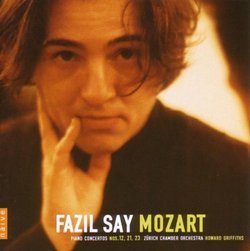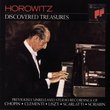| All Artists: Wolfgang Amadeus Mozart, Howard Griffiths, Zurich Chamber Orchestra, Fazil Say Title: Fazil Say: Mozart Piano Concerti Nos. 12, 20 & 23 Members Wishing: 0 Total Copies: 0 Label: Valois Release Date: 1/18/2005 Genre: Classical Styles: Chamber Music, Forms & Genres, Concertos, Historical Periods, Classical (c.1770-1830), Instruments, Keyboard Number of Discs: 1 SwapaCD Credits: 1 UPC: 822186049921 |
Search - Wolfgang Amadeus Mozart, Howard Griffiths, Zurich Chamber Orchestra :: Fazil Say: Mozart Piano Concerti Nos. 12, 20 & 23
 | Wolfgang Amadeus Mozart, Howard Griffiths, Zurich Chamber Orchestra Fazil Say: Mozart Piano Concerti Nos. 12, 20 & 23 Genre: Classical |
Larger Image |
CD DetailsSimilar CDs |
CD Reviews3 of Mozart's Most Beautiful Piano Concerti, Nicely Played J Scott Morrison | Middlebury VT, USA | 01/18/2005 (5 out of 5 stars) "[When this review was written and submitted, Amazon had not gotten around to including the contents of this CD. Included are three piano concerti by Mozart: No. 12 in A, K. 414; No. 20 in C, K. 467; No. 23 in A, K. 488. Fazil Say is accompanied by Howard Griffiths conducting the Zurich Chamber Orchestra.]
Are there any music-lovers who having heard Mozart's piano concertos don't love them? (Well, there may be a few of them; I know one or two.) The rest of us cannot seem to get enough of them. Hence innumerable recordings of these and the other most popular concerti. This CD contains three of my favorites; indeed, I have played two of them and know them pretty well. The one I haven't played, but one I adore most of the 1782 concerti, is the K. 414. I am always beguiled by the opening of the first movement--particularly that lovely second theme with unison violins followed by unison violas with their three-note tag at the end of each phrase. Nobody but Mozart could have thought of something so simple and so incredibly lovely. Fazil Say, a thirtyish Turkish pianist who has made quite a splash recently not least because of a couple of CDs featuring his own compositions, plays in a masculine, straight-ahead but still nicely nuanced fashion here. If I'm not mistaken he supplies tiny elaborations (some maybe not so tiny) at cadential points, presumably his own, here and there in this concerto. He has a nice touch and an ability to sustain a line: e.g., note the return of the main section in the Andante movement. This is followed by the universally loved C major concerto of 1785, K. 467, with its nostalgically beautiful middle movement made more famous by the movie, 'Elvira Madigan.' I venture to guess that this concerto is the one Say has known and played the longest. He seems demonstrably more at ease in it--not to say that he doesn't manage the other two concerti quite nicely, it's just that here he seems even more at home here--and indeed he has written his own cadenzas (as well as a few semi-cadential foofaraws here and there). I suspect anyone coming on this performance unawares would be startled by his first movement cadenza which is sassy, containing as it does little crushed grace-notes that bounce around all the way from the topmost to the lowest notes of the Mozartean piano. I certainly was startled and was prepared not to like it, but it grew on me and has consistently made me smile when it comes around. The only problem with this cadenza is that is comes just before the mentioned second movement and the switch from sass to nostalgic melancholy is a little unsettling. That said, the Andante is played with subtle touch and grace. Griffiths and the Zürcher Kammerorchester, here and elsewhere, play with unfailingly beautiful tone, sensitive phrasing and clean ensemble. The Rondo finale is a given a fairy-like tutti opening until just before the piano's rumbustious entry, but from then on it's a romp. In this movement, too, there is a Say-composed cadenza, this one less startling but none the less effective. Possibly my favorite slow movement in all of Mozart is that in the A major concerto, K. 488. That f sharp minor theme is, I'm convinced, directly from heaven. Say plays it lovingly and is supported in kind by the orchestra; clarinet, bassoon and flute continue with the second theme gorgeously . The two outer movements are a suitable contrast to this heavenly middle movement but also contrast with each other. The first movement, although an allegro, has an air of morbidity about it, but the rondo finale is one of the most exhilarating ever to come from Mozart's pen. Say and his colleagues give it precisely the kind of brio it requires. There have been many, many recordings, as I say, of these concerti, but I have spent several days listening and re-listening to these performances and am fairly sure they will remain favorites, although I certainly wouldn't want to be without those of, say, Perahia, Curzon, Brendel, Solomon and Ashkenazy. Recommended. TT=74'28" Scott Morrison" |

